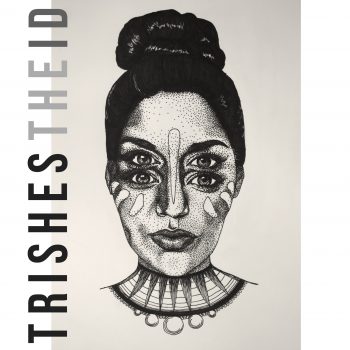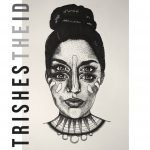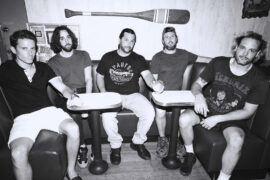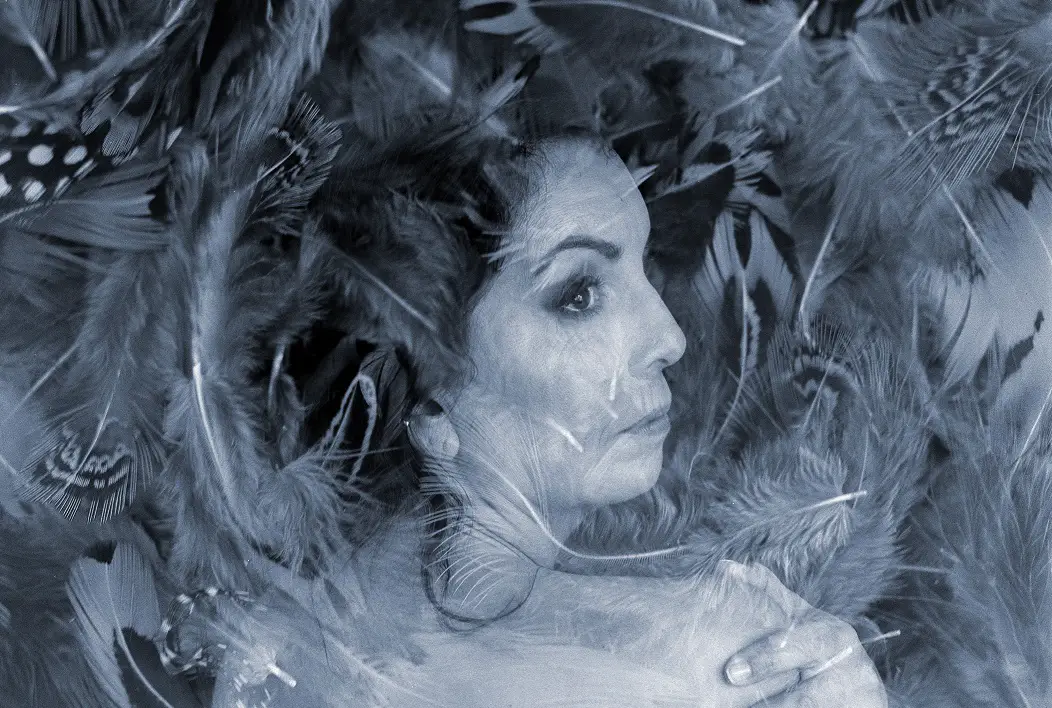Indie pop artist TRISHES dives into the depths in her captivating debut album ‘The Id’, a radiant display of art and identity’s coalescence that aims to explore and understand our innermost primal selves.
Stream: ‘The Id’ – TRISHES
My goal is to help people confront the emotions that they bury, because those emotions aren’t just harming them; they’re harming all of us.
Identity is a tricky beast: Who are we at our core? What motivates and moves us? Are we all just animals on the inside, or is there more to us than meets the eye? TRISHES’ debut album is a provocative, emotional exploration of the innermost primal self: A vivid dive into the human conscious and unconscious, The Id bops and pop with passion as the alt-pop artist reckons with her own drives and desires, seeking a deeper understanding of self alongside catchy beats and cathartic melodies.
It’s a radiant display of art and identity’s coalescence, and one that can’t help but remind us that, however complex we may think we are, we are all part animal on the inside.

“I wanted to create something that accurately expressed these internal struggles – and that was difficult because it’s a lot of emotional and mental work,” TRISHES says of her long-awaited LP. Released October 22, 2021 The Id is an evocative outpouring dwelling in spaces of pleasure and pain, cognition and impulse. The Trinidadian-American artist born Trish Hosein has been making music as TRISHES since the mid-2010s; she independently released her debut EP Ego in 2019, and was named an Atwood Editor’s Pick in 2020 for her intimate song, “Gaslight.”
Following a long string of soaring, stirring, and seductive singles releases that began last summer, The Id finds TRISHES radiating with purpose and resolve. Musically it’s experimental and left-of-center, while still undeniably catchy; big pop hooks and buoyant melodies propel songs through periods of great tension and release, while enchanting beats and creative samples, flavorful harmonies and creative dissonance captivate our ears throughout. Spoken-word interludes scattered throughout the LP lend further depth and substance to an already enticing journey.

Put together, this album provides a truly fascinating experience: TRISHES is in her element, confident and vulnerable all at once.
“The Id is an exploration of my primal self – the darker corners of my mind that I think it’s necessary to explore and be familiar with,” TRISHES tells Atwood Magazine. “Every song touches on some part of this subconscious self or the repercussions of suppressing this self.”
“One of the spoken word pieces talks about this myth that Michelangelo believed he was not creating, but finding a statue within the marble. That’s how I view art, and this album isn’t different; it was something I had to find.”
The album may be centered around her own being and experiences, but Hosein’s mission ultimately stretches far beyond herself. “I believe that all societal and global conflict begins from individual internal turmoil, and that examining those inner struggles is an essential part of affecting change,” she says.

The Id is really just the start: A template or blueprint to improving our world, one bit of empathy and understanding at a time. Yet one need not dive this deep on their inaugural listen: When you press play that first time, simply keep an open mind and willing spirit. Opening songs like “Animal” and “Hard as a Rock” showcase TRISHES’ vocal prowess and dynamism from the very top. For her, “Animal” is the record’s thesis statement; a reckoning, it finds her pleading with the almighty to understand why we are created with conflicting desires.
And that’s only the beginning. The back-to-back emotional heavyweights “Big Sunglasses” and “Heavyweights” lift our spirits while lighting a dramatic spark within; TRISHES calls “Big Sunglasses” a personal favorite; in it, she takes on both social media and war paint, observing “give us anonymity that can bring out the worst in us.” Elsewhere, the moving balladry of “Mine Would Be You” and “Taxi Man” may soothe a tender heart, and the trap influence on “Instant Gratification” (self-described as a “musical tantrum”) promises to get our bodies grooving and shaking.
The sample-turned backdrop of the searing “Venom,” The Id‘s lead single and theoretical midpoint, makes for an absolutely enthralling three-minute indulgence; the song itself explores the artist’s experiences with micro-aggressions and discrimination growing up as a Brown girl in the United States, and sees her channeling anger and pain into an impassioned, visceral upheaval:
I was born in the year of the snake
I was born in the month of the scorpion
You wonder why it stings almost every time I speak
Predisposed to the err of my ways
Got a temperament like a loaded gun
I blunder and I rage and I smile with all my teeth
I got venom on the tip of my tongue
Just like a scorpion, just like a snake
I got tough skin
Armor I was made in
Just like a champion
Rattle and shake
– “Venom,” TRISHES
Later on towards the record’s end, the sugary “Cotton Candy” finds a perfect marriage between TRISHES’ saccharine sonics, her vivid lyrical poetry, and her ambition to plunder the depths of the psyche. Soon after, “Riled Up” proves a cathartic close, providing a sense of both release and urgency as TRISHES leaves us revved up and ready to rise.

There’s something special about every song, making TRISHES’ debut one that truly needs to be heard in full in order to be understood and appreciated. Intense, unapologetic, and powerfully expressive, The Id is a fully engaged and engulfing listen. With sixteen stunning tracks spread over just 33 minutes, this album feels like a musical therapy session in and of itself.
Atwood Magazine recently connected with TRISHES to learn more about this LP and how its music and concepts came about. Describing her music as “raw, vivid, and emotional,” TRISHES holds nothing back in conversation, just as she presents her authentic and true self in song. Sigmund Freud’s id, ego, and superego may be an imperfect model – and the psychoanalytic theory does have its flaws – but certainly this record captures, in profound detail, the beauty and wonder of our primal selves.
— —
:: stream/purchase The Id here ::
A CONVERSATION WITH TRISHES

Atwood Magazine: TRISHES, can you share a little about the story behind this record?
TRISHES: The Id is an exploration of my primal self – the darker corners of my mind that I think it’s necessary to explore and be familiar with. Every song touches on some part of this subconscious self or the repercussions of suppressing this self.
What was your vision going into this record? Did that change over the course of recording this?
TRISHES: I wanted to create something that accurately expressed these internal struggles – and that was difficult because it’s a lot of emotional and mental work. I wouldn’t say that the vision changed throughout the process, but it got clearer. One of the spoken word pieces talks about this myth that Michelangelo believed he was not creating, but finding a statue within the marble. That’s how I view art, and this album isn’t different. It was something I had to find.
How did you first come up with the idea for exploring the Id? Was there a specific moment early on when you had that “a-ha!” moment, or is it more a means of understanding the album as a whole, after-the-fact?
TRISHES: A few songs into writing The Id I started realizing what it was. I was very much in a space or trying to gain clarity on morality both as to how it pertains to humanity and society and as to how it pertained to myself as an individual, so all of this subconscious stuff was coming up and it took me some time to realize it.
How do you feel The Id introduces you and captures your artistry?
TRISHES: I think it’s a really emotional and vulnerable work, that has moments of experimentation and wildness, and all of that is structured within something almost academic, something thought out and intellectual. I think that really captures who I am.

So many personal moments come to life in these songs, but I feel like through poetry, you also managed to create a sense of subtlety; in other words, you didn’t just come out and “say it.” We have to really listen. Are there any stories you really want your audiences to know, coming into this album? Would you mind sharing one or two, if so?
TRISHES: I don’t think it’s necessary to know any stories about me going into the album, but I think my experiences mirror experiences that women of color go through in the US all the time. I had one long-term relationship with a white man that influenced most of the album. He was very privileged and well connected and wealthy. The chasm between how he and his family experienced life and how me and mine did made me understand society in a deeper and more painful way. I address this a lot throughout the album but can be summarized in Venom’s second verse “I was born in the hot sun rays, far away from the desert oasis that you and yours were raised and that kept you smooth and fair.”
TRISHES: “Animal” was the first song I wrote for this project, so it sets the tone for the album because it really directed the album. When I started grappling with the idea of morality, trying to figure out what I actually believed and what I had just accepted blindly from society or family or religion, I kept coming down to this fundamental question of why we would want things that were not good. If we were made intelligently, it seems pretty cruel that our maker would give us a set of rules that we weren’t built to follow. So “Animal” is me pleading with my maker, or cursing them. Either way it’s supposed to be a sort of helpless, painful questioning.
“Venom” was your first single, and that sample is just enchanting. Can you talk about what we’re hearing there, and how you can to use that as a backdrop for the whole song?
TRISHES: Yes absolutely, that sample is my voice going through the TC Helicon Voice Live Touch 2 processor using a “gender bend” effect. I really love looping I think in part because I’m a really circular thinker, I just think in loops until something clicks, almost like a meditation. I’m pretty sure that song, like many of these songs, came about from me just messing around on my loop station.
Can you share a little about the spoken word segments sprinkled throughout?
TRISHES: The spoken word segments help guide the listener through the tangled web of my psyche. The project can be a little heady and a little heavy and I love using the spoken word to prepare the listener a little more.
I really love the cinematic intensity and grandiosity of ''Big Sunglasses.'' Can you share a bit about the size and scope of that song?
TRISHES: I knew The Id had to have a song about anonymity. I’m fascinated by anonymity and its effect on human behavior because I think we act more like our primal selves when we can’t be seen or held accountable. When I started looking into this, I found a study that showed that if someone is wearing big sunglasses they are less likely to give an unhoused person on the street money. So I used the sunglass metaphor to represent our greater relationship to anonymity – something we can see playing out in things like social media, but we can also see affect us in our earliest tribal days when we wore faceprint into battle.

Interestingly, the next song is the more tender, impassioned ''Chemicals.'' What does this song represent for you?
TRISHES: “Chemicals” is about the Id emerging in this pleasant way that is infatuation. Falling in love is really this primal takeover, and it’s just as helpless as anger or violence, it’s just as out of control, but it’s euphoric. And because it’s euphoric it can cloud our judgment even more so than our other primal urges.
I really love the vocal craft of “Instant Gratification.” How did this song come to be?
TRISHES: “Instant Gratification” was so fun. We (me and Producer Hakan Mavruk) just wanted to make a big tantrum but we wanted it to also be kind of dark and twisted. I think I had all of the top line written, but it’s really all on one chord, so a lot fell on the production. We also got to record a theremin solo for this one and I think that really captured the chaotic energy we were aiming for.
You close the record with “Riled Up,” and I do feel like it serves its purpose in energizing your audience at the very end. Why put this song here? What was the idea behind leaving us “riled up” like that?
TRISHES: I am this eternal optimist. I would maybe say a short-term pessimist and long term optimist. So I think ending the album like that is my way of saying yes, this internal work is hard, and it can be painful and tiring, but it is also so beautiful and freeing and full of life and force and friction and color and wonder. And it is worth it.
Do you have any definitive favorites or personal highlights off this record?
TRISHES: I think “Big Sunglasses” is my favorite record, and I think that was the first thing that Hak and I wrote together.
Do you have any favorite lyrics in these songs?
TRISHES: I think my favorite lyric is “My mind is like an MC Escher house, I’m running down the stairs and I can’t get out” from “Cotton Candy.”
I immediately caught that line the first time I listened to ''Cotton Candy'' – there's some fantastic (and quite powerful) poetic imagery in that song. Lastly, what do you hope listeners take away from The Id? What have you taken away from creating it and now putting it out?
TRISHES: My goal is to help people confront the emotions that they bury, because those emotions aren’t just harming them, they’re harming all of us. When we suppress fear and shame they manifest into things like bigotry, racism, violence and nationalism. I believe so much in structural change and part of my life’s work is to work for social justice through that change – but I don’t believe we’ll reach global equity and equality if we change laws without changing the implicit bias’ that resides in all of us.
— —
:: stream/purchase The Id here ::
— — — —

Connect to TRISHES on
Facebook, Twitter, Instagram
Discover new music on Atwood Magazine
? © Alejandra Ocampo
:: Stream TRISHES ::








